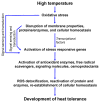Physiological, biochemical, and molecular mechanisms of heat stress tolerance in plants
- PMID: 23644891
- PMCID: PMC3676804
- DOI: 10.3390/ijms14059643
Physiological, biochemical, and molecular mechanisms of heat stress tolerance in plants
Abstract
High temperature (HT) stress is a major environmental stress that limits plant growth, metabolism, and productivity worldwide. Plant growth and development involve numerous biochemical reactions that are sensitive to temperature. Plant responses to HT vary with the degree and duration of HT and the plant type. HT is now a major concern for crop production and approaches for sustaining high yields of crop plants under HT stress are important agricultural goals. Plants possess a number of adaptive, avoidance, or acclimation mechanisms to cope with HT situations. In addition, major tolerance mechanisms that employ ion transporters, proteins, osmoprotectants, antioxidants, and other factors involved in signaling cascades and transcriptional control are activated to offset stress-induced biochemical and physiological alterations. Plant survival under HT stress depends on the ability to perceive the HT stimulus, generate and transmit the signal, and initiate appropriate physiological and biochemical changes. HT-induced gene expression and metabolite synthesis also substantially improve tolerance. The physiological and biochemical responses to heat stress are active research areas, and the molecular approaches are being adopted for developing HT tolerance in plants. This article reviews the recent findings on responses, adaptation, and tolerance to HT at the cellular, organellar, and whole plant levels and describes various approaches being taken to enhance thermotolerance in plants.
Figures







References
-
- Intergovernmental Panel on Climate Change (IPCC) Contribution of Working Group I to the Fourth Assessment Report of the Intergovernmental Panel on Climate Change. Cambridge University Press; Cambridge, UK: 2007. Climate change 2007–The physical science basis.
-
- Lobell D.B., Field C.B. Global scale climate–Crop yield relationships and the impacts of recent warming. Environ. Res. Lett. 2007;2 doi: 10.1088/1748-9326/2/1/014002. - DOI
-
- Hasanuzzaman M., Hossain M.A., da Silva J.A.T., Fujita M. Plant Responses and Tolerance to Abiotic Oxidative Stress: Antioxidant Defenses is a Key Factor. In: Bandi V., Shanker A.K., Shanker C., Mandapaka M., editors. Crop Stress and Its Management: Perspectives and Strategies. Springer; Berlin, Germany: 2012. pp. 261–316.
-
- Hasanuzzaman M., Nahar K., Fujita M. Extreme Temperatures, Oxidative Stress and Antioxidant Defense in Plants. In: Vahdati K., Leslie C., editors. Abiotic Stress—Plant Responses and Applications in Agriculture. InTech; Rijeka, Croatia: 2013. pp. 169–205.
Publication types
MeSH terms
Substances
LinkOut - more resources
Full Text Sources
Other Literature Sources

